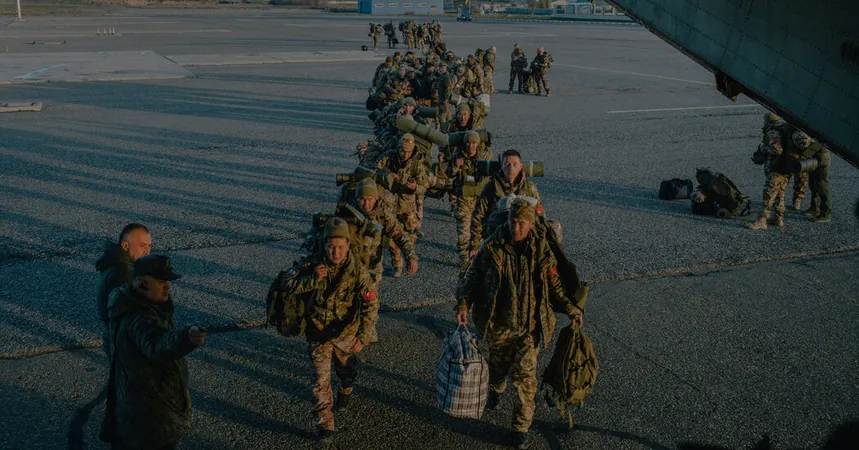
The Disturbing Tactics of Russia's Recruitment Drive: Are Criminals the New Soldiers?
2024-12-30
Author: Kai
Introduction
In the midst of its ongoing conflict with Ukraine, Russia is grappling with an acute shortage of soldiers. The relentless waves of casualties have drained the ranks of even its most trained troops, compelling the Kremlin to adopt increasingly desperate recruitment measures. While initial strategies included sending tens of thousands of convicts to the front lines, the scope of recruitment has now broadened alarmingly to include virtually anyone—regardless of their legal standing.
Legal Loopholes and Recruitment Strategies
Amidst the chaos of war, new laws have emerged that invite suspects detained by police to join the military in exchange for dropped charges—a grim decision that has transformed soldiers into recruits from the criminal underbelly of society. Individuals facing serious allegations, such as murder and theft, are being offered a reprieve from their legal troubles just by signing contracts to fight. A troubling example of this practice was illustrated when two men arrested for smuggling a substantial cocaine shipment worth around $30 million had their charges dismissed in exchange for military service.
A Shift in Military Strategy
As the war intensifies, legal loopholes have become a systematic way to replenish military ranks. The Kremlin's ongoing urgency is not merely about numbers but is also about the strategic need to regain territory as tensions with Ukraine escalate. The recent law signed by President Vladimir Putin allows individuals to begin military enlistment from the moment a case is opened against them, thus inviting not just criminals but anyone with substantial debts into the fold.
Targeting Debtors and Vulnerable Populations
Desperate measures have been implemented to recruit chronic debtors. Under a recent law that took effect, individuals with debts up to 10 million rubles (around $100,000) can have their liabilities cleared if they agree to serve in the military. This initiative targets men with significant overdue alimony payments, creating a new class of soldier from those at the margins of society.
Raids and Coercion
The military is also conducting raids in markets and public spaces, targeting recent immigrants who have yet to register for military service. These operations have led to swift detentions, often with individuals being whisked away to join the fight. However, the full scale of this recruitment effort remains shrouded in secrecy as there is no central registry documenting these individuals.
The Cost of Recruitment
As traditional recruitment pathways — with monthly enlistment estimates of about 30,000 — become less effective, the military is increasingly leaning on criminals given that their enlistment is considerably cheaper. This stark reality raises questions about the long-term implications of blurring the lines between crime and military service.
Human Rights Concerns
Human rights activists are cautioning against these practices, warning of a troubling future where crime and military service become interchangeable. Olga Romanova from Russia Behind Bars expressed concern about the potential societal impacts, noting that creating a system where crime is rewarded with military enlistment could have dangerous repercussions on public safety and morality.
Survival or Desperation?
Interestingly, some individuals are turning to the military as a means of survival, viewing it as a preferable alternative to the dire conditions of Russian prisons. As one opposition figure described, he believed that his chances of survival on the battlefield were better than in prison, indicating a grim reality dominated by despair.
Recruitment of Corrupt Officials
The recruitment strategies also extend to former corrupt officials and politicians recently convicted of crimes. In Vladivostok, high-profile former mayors and local officials have sought military contracts in exchange for their freedom, hoping that combat will cleanse their tarnished reputations. However, a contentious debate continues about whether these men could fight loyally, given their backgrounds.
Targeting Immigrants
Additionally, newly naturalized immigrants, particularly from Central Asia, are being swept into military service through enforcement raids. There are reports of stunned workers from these communities being given summons for military training as soon as they sought to finalize their paperwork at draft offices.
Police Incentives and Coercive Practices
Behind these desperate recruitment tactics lies an unsettling reality—police incentives for enlisting suspects may amount to $500 in wealthier areas, further incentivizing coercive practices. Those who decline these offers risk an uncertain fate, facing potential imprisonment.
Conclusion
As Russia struggles to maintain its presence on the battlefield, the convergence of crime, punishment, and military service raises profound ethical concerns and questions about the future fabric of Russian society. Are we witnessing the birth of a new breed of soldiers—one where allegiance is forged not by valor, but by desperation? The answers remain as murky as the conflict itself.


 Brasil (PT)
Brasil (PT)
 Canada (EN)
Canada (EN)
 Chile (ES)
Chile (ES)
 Česko (CS)
Česko (CS)
 대한민국 (KO)
대한민국 (KO)
 España (ES)
España (ES)
 France (FR)
France (FR)
 Hong Kong (EN)
Hong Kong (EN)
 Italia (IT)
Italia (IT)
 日本 (JA)
日本 (JA)
 Magyarország (HU)
Magyarország (HU)
 Norge (NO)
Norge (NO)
 Polska (PL)
Polska (PL)
 Schweiz (DE)
Schweiz (DE)
 Singapore (EN)
Singapore (EN)
 Sverige (SV)
Sverige (SV)
 Suomi (FI)
Suomi (FI)
 Türkiye (TR)
Türkiye (TR)
 الإمارات العربية المتحدة (AR)
الإمارات العربية المتحدة (AR)